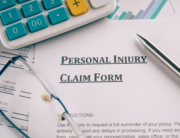If a car crash or another type of accident caused a herniated disc in your spine, your focus should be on recovering and getting back to the everyday activities of your life. But if you are facing costly medical bills and worrying about filing an insurance claim, that recovery may be difficult.
In most cases, you can file an insurance claim for a herniated disc. Instead of worrying about the details, consider enlisting the help of the injury accident attorneys at the Montero Law Center to assist you in filing your insurance claim and in pursuing the compensation you deserve. Contact us today at 954-767-6500.
What do you need to file a herniated disc insurance claim?
A herniated disc, also called a ruptured disc, occurs when one of the rubbery, gel-filled discs between your spinal vertebrae ruptures, allowing some of the contents to escape. This allows the vertebrae to compress and, as the gel-like substance presses on nearby nerves, the resulting inflammation and pressure can cause significant pain.
A herniated disc can result from a car accident, truck or motorcycle accident, bicycle crash, pedestrian accident, a slip and fall accident or a work-related injury. These injuries occur most often in the lower spine, causing significant pain, weakness, and numbness in the back, hips, and lower extremities. However, this injury can affect any part of your spine, including the neck.
The appropriate treatment for a herniated disc depends on the specific nature of your injury and the judgment of your treating physician.
To file an insurance claim for a herniated disc, you must provide the insurance company with sufficient evidence—typically in the form of medical records and doctors’ statements—that documents your injury, your treatment, and prognosis.
You must also supply records documenting your time off work and your regular compensation structure, as well as proof of any other damages you suffered as a result of the accident.
Finally, you must establish liability for the accident that caused your injury.
How can you establish liability for a herniated disc?
To prevail in your insurance claim for a herniated disc, you must establish liability, or fault, for the accident that caused your injury.
Establishing liability requires proving that the defendant was negligent in some way. You prove negligence by demonstrating the four key components.
- Duty of care: The defendant owed a duty of care to you. In a car accident, for example, drivers on the road owe a duty of care to other motorists, pedestrians, etc.
- Breach of duty: The defendant breached that duty in a careless or intentional manner.
- Causation: The defendant’s breach of duty caused an accident.
- Damages: You suffered actual, measurable negative effects from the accident.
Our attorneys can also use this supporting information to determine the appropriate amount of your herniated disc claim, based on the damages you suffered.
How do you determine the compensation amount for your disc injury?
The amount of compensation you should seek in your herniated disc insurance claim depends on the details of your injury, the types of treatment you had or will need, and your overall prognosis.
We can help in establishing the approximate value of your injury, but the total claim starts with your out-of-pocket costs, such as doctor bills, medications, and care costs. Your claim should also include any future medical costs, lost wages, and future earning losses.
Placing a value on your physical injury depends on the severity. For example, losing your dominant hand or arm carries a higher value than losing your non-dominant hand.
Disfigurement, including permanent scars that alter your physical appearance, carries additional value for the mental anguish you experience as a result. Consequently, visible injuries have a higher value than invisible injuries.
Finally, we can include intangible damages in your claim if you suffered a permanent injury. This includes items such as pain and suffering, loss of enjoyment of life, and your spouse’s loss of consortium.
Our lawyers can calculate the total of your claim based on these and other factors that may be unique to your case.
Anticipating obstacles and arguments to your claim
A claims adjuster’s job is to help the insurance company avoid paying claims or to minimize the award as much as possible. For that reason, you may face obstacles in the claims process, including an initial denial of your herniated disc insurance claim.
Insurance companies rely on several common justifications to deny injury claims.
Preexisting Condition
Because herniated discs can also result from overuse or the wear and tear of time, the insurance company may claim that your injury was preexisting at the time of the accident.
If you are carrying a few extra pounds, they may argue that your weight caused the injury. If you work in an industry that involves manual labor, driving, or even sitting at a computer for much of the day, they will attempt to argue that your job caused your injury. Or, if you are above the age of 30, they may argue that you had a herniated disc previously and that the incident in question merely activated your symptoms.
Rest assured, they will carefully research your past medical records, insurance claim history, and even your social media feeds. The more serious your herniated disc injury, the harder the insurance company will try to prove the preexisting condition objection.
Non-Permanent Injury
If you are seeking punitive damages against the party that caused your herniated disc, Florida law requires proof that you suffered a permanent injury. Consequently, the insurer will often attempt to prove that your injury is a temporary one.
This argument requires the testimony of a physician chosen by the insurance company. You will also have the opportunity to present expert testimony to the contrary so the veracity of your doctor’s testimony must be without question.
Incorrect Diagnosis
In attempting to deny your insurance claim for a herniated disc, the insurer may argue that you sustained a different type of spine injury, such as a bulging disk. Much like the non-permanent injury argument, the deciding factor for this obstacle may come down to which medical expert’s testimony appears more credible.
Timing of Medical Treatment
For many accident victims, the emergency room (ER) doctors do not render a herniated disc diagnosis. In the ER, the medical team typically administers testing, such as x-rays or CT scans, neither of which can accurately diagnose this particular type of spinal injury.
A confirmatory diagnosis of a herniated disc injury usually requires the use of an MRI scan, which may not come until days later when you seek follow up care for back pain.
The insurance company may use this delay to argue that your injury became permanent not because of the accident but because you delayed seeking medical treatment.
When do you need an injury accident lawyer on your side?
Filing a successful insurance claim for any injuries suffered in an accident is challenging. A herniated disc claim can be especially difficult unless you have experience and a strong knowledge of the law.
Using the services of one of the attorneys at the Montero Law Center offers a number of clear benefits for your claim. We can help you understand the process and help protect your legal rights. We can work with doctors and expert witnesses to provide clear evidence of your injury and build a strong case to prove fault in the accident.
Contact us to schedule a free consultation and case review and to learn more about filing an insurance claim for a herniated disc. Call 954-767-6500 today.
 English
English  Español
Español 




